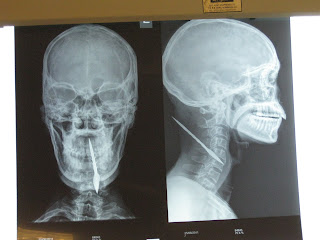This week, a fifty year old man walked into Casualty (British for Emergency Department) complaining of being shot in the neck by an arrow. He claims he was gardening when a young boy shot him on purpose unprovoked. The arrow went posterior to anterior into the base of his neck. Surprisingly, he was fairly stable, alert and oriented, and talking. The only exam finding was left-sided decreased strength on the upper and lower extremity, but otherwise he was intact
neurovascularly. For immediate management, he was
hypotensive when he came in and was resuscitated with one liter of intravenous fluids.
We
couldn’t assess how deep the arrow had gone until we got the lateral and anterior-posterior cervical spine X-ray films shown below. Obviously, the arrow went much deeper than we had hoped and our patient was sent to Theatre (British for Operating Room) for Exploration and Foreign Body Removal. Dr. Bacon, a trained Orthopedic Surgeon from North Carolina did the surgery since we do not have a trained Neurosurgeon at
Tenwek Hospital. At
Tenwek, staff members are often asked to work outside of their area of expertise, as in this case. He was able to completely remove the arrow, noting that it had torn through part of the
Dura Mater that encases the spinal cord। He said he was unable to determine if the spinal cord had been damaged due to extensive bleeding.

Reports are that the patient is recovering well. It may take a while until we know the full extent of the damage to neurological function. As far as his social situation is concerned, we still have questions about the incident. Stealing in Kenya is a very serious offense. One report we heard was that a woman’s arm was chopped off because she was stealing tea leaves from a farm. Whether our patient’s “gardening” was actually thievery remains to be determined. People are reluctant to go to the police because they know the perpetrator often gets away with the crime via bribery.
Similar incidents are actually not uncommon here in Kenya. In fact, injuries from arrows or spears are more common than gun shot wounds at
Tenwek Hospital. Violence occurs whether guns are widely available or not. Guns are outlawed unless authorized by the military. In Northern Kenya, however, arms are quite available, being shipped in illegally from Somalia.
Lethality is an argument used against
guns. In the case above, had our patient been shot with a gun, we would have
died. However, the purpose of a well-regulated militia, as George Mason puts it is to "prevent
enslavement." This requires lethal weapons owned by the
citizenry.
The Kenyan staff in Casualty was surprised that I owned two guns and that owning a gun did not require a license in many States in the United States. I taught them some American history about our 2
nd Amendment and “Right to Bear Arms.” From discussions with Kenyans, I would argue that Kenya needs reforms in many areas politically as corruption is very prevalent here. A trustworthy military and police force would be a good place to start.
Violence broke out in 2007 over election results, but the elections next year are not expected to cause the turmoil they did this year. It is still something we can keep in our prayers.
A few quotes below make clear the purpose of the 2
nd amendment:
"I ask, Sir, what is the militia? It is the whole people. To disarm the people is the best and most effectual way to enslave them." --George Mason, Co-author of the Second Amendment during Virginia's Convention to Ratify the Constitution, 1788
"Firearms stand next in importance to the constitution itself. They are the American people's liberty teeth and keystone under independence … from the hour the Pilgrims landed to the present day, events, occurrences and tendencies prove that to ensure peace security and happiness, the rifle and pistol are equally indispensable … the very atmosphere of firearms anywhere restrains evil interference — they deserve a place of honor with all that's good." --George Washington, First President of the United States
"To preserve liberty, it is essential that the whole body of the people always possess arms and be taught alike, especially when young, how to use them."
Richard Henry Lee, American Statesman, 1788
"Those who hammer their guns into plowshares will plow for those who do not."
Thomas Jefferson, Third President of the United States
-- Quotes from taken from: http://cap-n-ball.com/fathers.htm.







